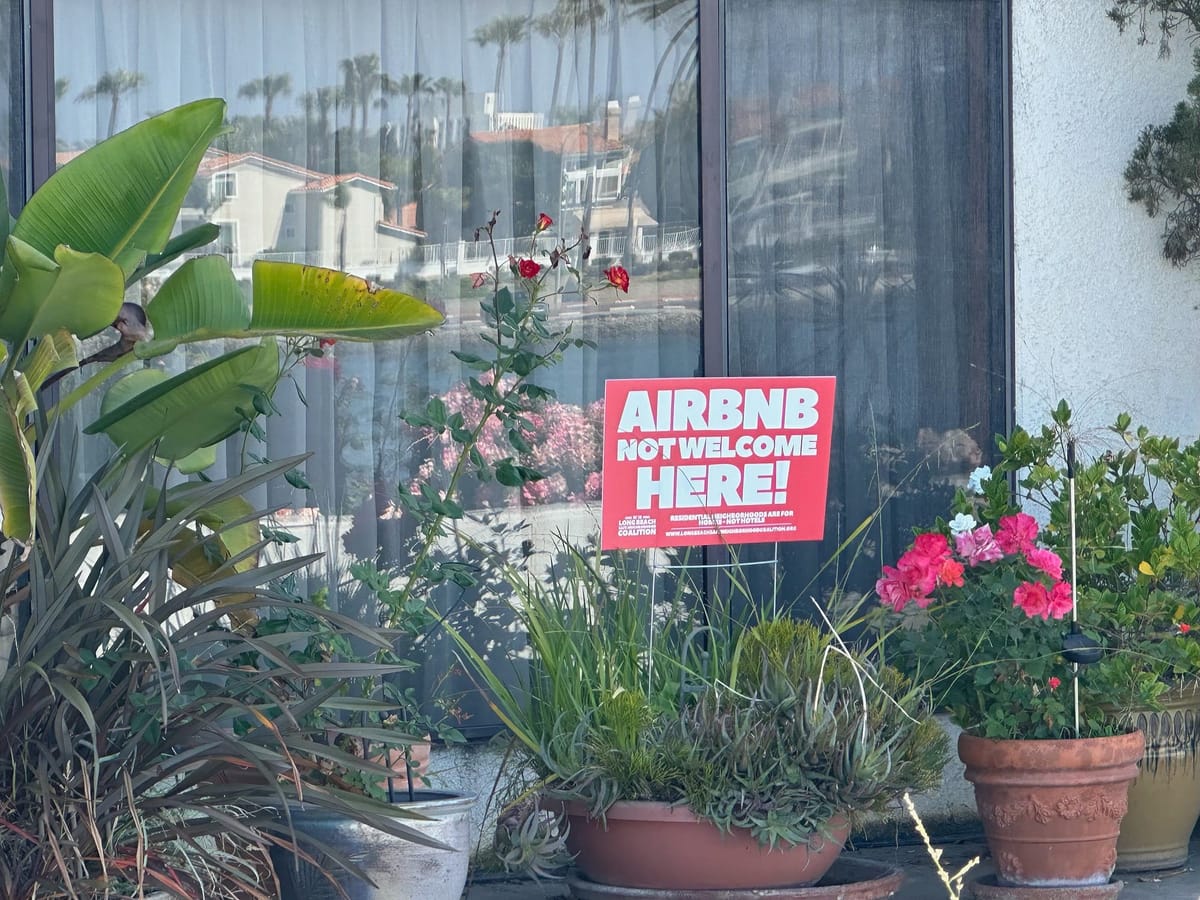Long Beach neighborhoods gear up for short-term rental fight
People on both sides of the issue agree the city needs to do more to enforce the rules it has.

By Wednesday, Melissa Rakiey and some of her fellow residents in Belmont Park are hoping to win enough support to ban unhosted short-term rentals from their east Long Beach neighborhood.
Rakiey’s is just the latest neighborhood to pursue a ban amid complaints about overcrowded parties, illegal parking, and noise at all hours of the day and night — and, Rakiey said, after she tried and failed to get city officials to address the issues.
Since 2021, a dozen communities around the city have sought to end the practice of temporary home rentals with no owner or manager on site, but so far just one petition got enough signatures from residents to enact a ban.
That was in College Estates, where a headline-grabbing shooting in January spurred residents to try to oust unhosted short-term rentals; they narrowly won last month, with support from just over half of the roughly 750 homes in the census block.
The Belmont Park effort is the only one currently pending, but it won’t be the last — the city’s petition process allows residents who fail to try again, and some neighborhoods are already planning for round two.
But city leaders are still struggling to resolve the broader contention over short-term rentals: how to balance the competing interests of residents and tourist-serving businesses that generated more than $4.6 million in revenue for the city last fiscal year.
Growing popularity — and complaints
Vacation rentals have been around for years in coastal towns, but when the market increased with the popularity of booking websites like Airbnb and Vrbo, Long Beach officials decided to regulate and tax them.
Under rules the City Council first adopted in 2020 and has been tweaking since, anyone hoping to operate a short-term rental must apply for a city permit, and operators pay the same 13% room tax as hotels and motels.
At present, Long Beach has 242 short-term rentals with a host on-site and 632 unhosted rentals, according to city information.
The city urges residents with complaints (noise is the most common) to call a 24-hour hotline or, for more serious concerns, the Long Beach Police Department.
But how complaints are received and dealt with (or not, as some neighbors allege) are among the things residents take issue with.
Steve Carr, who lives in the Plaza West neighborhood east of the airport, said when he has called about problems with the short-term rental next door to him, the hotline seemed like a black hole. The complaints are transcribed and passed along to the city, but he’s never seen any followup or enforcement.
Annoyed by an unruly weekend-long party at the rental, Carr called the police non-emergency number, he said, but no officers showed up.
Rakiey said visitors staying in the rental next to her house will turn on the outdoor TV and chat over the noise of the hot tub late into the night. Once, she said she couldn’t leave to get to work because a guest’s car was blocking her driveway. More than 50 people crammed into the three-bedroom house for a party in March, she added.
City officials have told her the code enforcement worker who handles complaints isn’t available on nights or weekends, and they wouldn’t accept her photos and videos as evidence of improper activities, she said.
Despite multiple complaints to the hotline and the police, “there has yet to be a police report, a citation, a violation of any sort,” Rakiey said. “The enforcement really is the failure of the whole ordinance.”
Alicia Robinson has been on strike from the Long Beach Post since March 21, yet she’s still covering the city without pay. Thank her for her work.
Owners and managers of short-term rental properties have their own issues with the city’s procedures and with angry neighbors, but some argue they’re mostly responsible businesses being unfairly maligned because of a few high-profile problems.
“Thousands of people come here every year with no incidents at all,” said Michael Cole, who has lived in Long Beach for more than 20 years and runs a small business managing short-term rental properties here on behalf of the owners.
His clients use their rental income to make ends meet or as a modest investment, and many just own one rental property, Cole said. He introduces himself to neighbors of the properties he manages and gives them his home phone number. In the past year, he’s gotten a single call about noise that was quickly resolved, he said.
“I have a vested interest in making sure that the neighbors are happy with my properties,” Cole said, adding that at most short-term rentals in Long Beach, “to try to say that there’s a constant cavalcade of parties next door, (it’s) not happening.”
‘Set up to fail’
People on both sides of the debate agree on one thing: there are problems with the city’s process that allows neighbors to petition for a ban.
For residents who are frustrated with nuisance guests and inattentive or even hostile owners, winning a petition drive to restrict short-term rentals can seem like an uphill fight, Carr and Rakiey said.
The city charges a $1,050 fee to mail petitions to all properties in the census block, then tally the ones that get returned with a signature and determine the results. There can be hundreds of homes eligible to vote, and some residents may think the petition is junk mail.
To restrict unhosted rentals, more than 50% of homes in the census block must send their signed petitions back to the city. To date, the smallest area to vote included more than 200 homes.
Carr said he recently learned his effort fell short by 10 homes, out of more than 400 that received petitions.
“Everything in the end has become a roadblock for us,” he said. “It’s set up to fail.”
Rakiey has been spreading the word to encourage her neighbors to send their petitions in. But she’s upset by what she sees as a major conflict of interest for the city. “They’re the ones counting the petitions, and they’re the ones benefiting from the tax revenue” that short-term rentals generate, she said.
City data shows hotel room taxes have rebounded along with tourism. Taxes paid by short-term rental guests made up about 14% of the $33.2 million in hotel taxes Long Beach collected in fiscal 2023, and the rentals have already brought in more than $2.8 million this fiscal year, even before adding in summer vacation season (the city’s fiscal year runs from October to September).
Rental operators like Cole are more concerned about money from another source: organizations that pay residents’ petition filing fees and help them knock on doors to encourage people to support a ban.
One group called Better Neighbors LA, which is supported by hotel workers union Unite Here Local 11, has backed several petition drives in Long Beach. Cole said he’s seen multiple rounds of door-knocking and text messaging campaigns against short term rentals.
He’s also worried that sending petitions on city letterhead could make it appear Long Beach supports bans on short-term rentals, and he thinks the citywide bans some neighboring communities have adopted simply drive the market underground. (Better Neighbors LA is pushing Long Beach officials to forbid short-term rental stays of less than 30 days.)
While their dispute may seem intractable, rental operators and residents say they want the city to better enforce the existing rules. That could be coming — in April the City Council laid out ideas such as requiring that units be rented for at least a day (some are reportedly available by the hour), beefing up penalties for rule violations, and potentially adding another code enforcement inspector.
Meanwhile, Rakiey is hoping to get enough signatures by the Wednesday deadline, and Carr said he and some of his neighbors will be taking a second run at the petition process.
“I think more people have now been informed” about short-term rentals, he said, adding, “the fight is not over.”
But Cole believes there’s a way to give residents peace in their neighborhoods while still allowing short-term rentals.
“The folks on the hosting side also want to get rid of bad operators,” he said. “You don’t have to shut down everybody’s business in order to make this work right.”
Long Beach Watchdog is a reader-supported publication. To receive new posts and support our work, please consider subscribing.
'This has broken my whole family': Family mourns death of mother killed in shooting
Fernando Haro • Jun 21, 2024

The bond Myriam Zaragoza shared with her family was irreplaceable. The mother of two was the life of the party everywhere she went, her family said. A showstopper who would make everyone laugh and smile with her bubbling personality. But that bright light Zaragoza brought to other’s lives was cut …
Read full story →
We need your support.
Subcribe to the Watchdog today.
The Long Beach Watchdog is owned by journalists, and paid for by readers like you. If independent, local reporting like the story you just read is important to you, support our work by becoming a subscriber.





